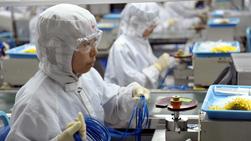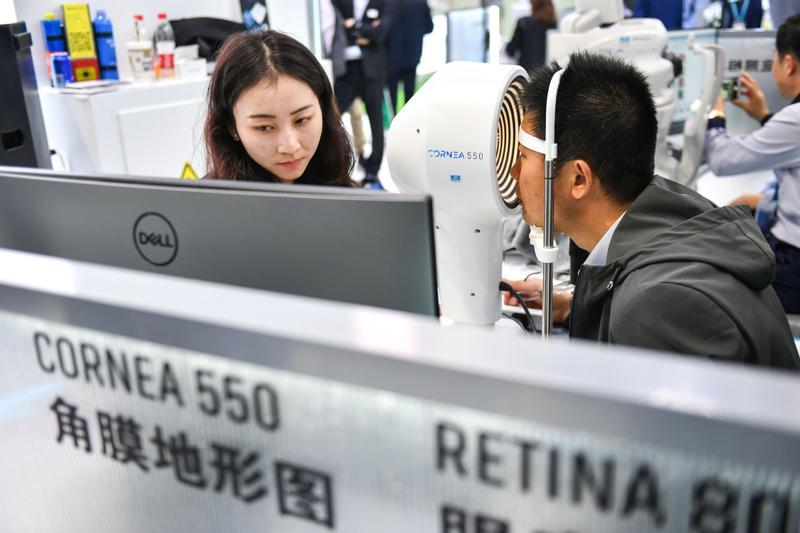Shanghai adopts prompt steps to help businesses get back to work
 Employees work on the production line of a TE Connectivity China facility in Dongguan, Guangdong province. (PHOTO BY CHEN WEN / CHINA NEWS SERVICE)
Employees work on the production line of a TE Connectivity China facility in Dongguan, Guangdong province. (PHOTO BY CHEN WEN / CHINA NEWS SERVICE)
Even during the peak of the novel coronavirus outbreak, the Shanghai plant of German chemical giant Covestro has kept operating all along. The company's integrated site in Shanghai, the largest of its kind worldwide, churns out raw materials used for producing epidemic-prevention supplies such as protective goggles, spandex fiber mask straps and medical adhesives.
The stunning speed is inseparable from the government's support to help companies normalize operations
Holly Lei, President, Covestro China
Designated by local authorities as a key supplier of epidemic-prevention materials, Covestro originally faced the pressing dilemma of needing to maintain full-capacity manufacturing amid a potential workforce and raw materials shortage sparked by logistics restrictions meant to prevent further spread of the outbreak.
ALSO READ: Sinopec to raise output of key raw material for masks
By reaching out to the Administration Committee of the Shanghai Chemical Industry Park, the company obtained transportation permission around the production region the very next day, and in two days' time, received authorization allowing its vehicles hassle-free access across provinces from the Shanghai Municipal Economic and Informatization Commission.
"The stunning speed is inseparable from the government's support to help companies normalize operations," said Holly Lei, president of Covestro China.
Lei cited measures including a 28-point circular in Shanghai to revive business and a suite of policy waivers to smooth transportation within the Yangtze River Delta region, all of which "are huge, positive boons to our business".
Following the central authorities' portfolio of incentives to mitigate impacts of the outbreak, local authorities at all levels are taking prompt steps to infuse confidence and help businesses get back to work.
Reggie Lai, vice-president and general manager of TE Connectivity China, said his company and clients are beneficiaries of nuanced policies and responsive government officials at the Suzhou Industrial Park.
"I've submitted our urgent request for earlier resumption of work via WeChat (a popular messaging tool), and officials began proceeding with the case within the blink of an eye," Lai said.
Following swift on-site inspections - thorough examinations of required documents and a subsequent modification - one of TE's subsidiaries in Jiangsu province, which supplies materials for the production of medical equipment, managed to resume operations "at a much faster pace than anticipated", he said.
"The policies are prompt, clear and preemptive, which reflect a mature and systematic governance model that the government has always been pursuing," said Jiang Hao, global partner of consultancy Roland Berger.
 Visitors undergo an eye test at the booth of French lens maker Essilor during the Second China International Import Expo in Shanghai on Nov 6, 2019. (PHOTO BY MAI TIAN / FOR CHINA DAILY)
Visitors undergo an eye test at the booth of French lens maker Essilor during the Second China International Import Expo in Shanghai on Nov 6, 2019. (PHOTO BY MAI TIAN / FOR CHINA DAILY)
Apart from cutting red tape and accelerating administrative approvals, governments at all levels have addressed personnel, management needs and corporate financial problems.
French pharmaceutical giant Sanofi stood to benefit from a directive by the Beijing Economic-Technological Development Area, which detailed 10 policies from catering, transportation, new market opportunities and stabilized employment to bolster growth.
"We are impressed by a manual containing the latest policy updates," said He Guoling, general manager of Sanofi (Beijing) Pharmaceuticals Co Ltd. "Our company has enjoyed a number of perks from accommodation arrangement to the provision of masks."
Jiang from Roland Berger noted that some of the policy highlights include a torrent of financial and legal support to small and even micro enterprises, which constitutes part of the company's downstream customers. "These measures are conducive to addressing capital shortages and maintaining overall market stability," he said.
"Even for large companies like us, the cash situation is very much challenged by the tremendous reduction in revenues," said Francois Tardif, president of Faurecia China.
Tardif also appreciated measures on the postponed adjustment of the social security payment base and the extension of payment period, saying they are "of great support" at such a special period of time.
From late February, the Shanghai Municipal Commission of Commerce has kicked off a two-week survey on a select group of foreign enterprises in the city to help them better resume operations and attend to any unmet needs in the midst of the novel coronavirus outbreak.
The purpose of the survey is to get a clearer picture of the prevention and control measures multinational corporations have taken against the virus and to solve problems that prevent them from returning to operational normalcy. The survey is conducted primarily through on-site inspections, coupled with seminar discussions and questionnaire-based surveys.
"Government officials from both the municipal and district levels have toured our plant, interacted with our on-site staff members and helped solve any problems on the spot," said Charles Kao, China president of Amorepacific, a South Korean cosmetics company.
Thanks to the numerous favorable policies, Kao said his company has seen a number of glitches being quickly ironed out, such as the logistical hurdles encountered by two downstream suppliers and the shortage of surgical masks.
The recent surge in novel coronavirus cases in South Korea has not hindered Amorepacific's China operations. Yet the company has still taken some precautionary measures, such as removing the shared dishes from the menu at its canteen and adopting shift work mechanisms to minimize interaction.
Not only companies with major manufacturing bases stand to enjoy such perks. The Shanghai office of MSL, a public relations agency, was provided with a package of accommodation subsidies for its employees who suffered losses in rent owing to the temporary restrictions of population flows.
READ MORE: China's consumer inflation eases to 5.2%
"The Putuo district officials (in Shanghai) have been very helpful, attending to our most pressing needs two days prior to the resumption of work," said Liza Zhang, general manager of MSL Shanghai.
Apart from delivering sanitary goods such as surgical masks, hand sanitizers, hand wipes and alcohol cleansers, they were informed of a 12-point measure by the district government to tackle difficulties for companies.
"We are deeply touched and heartened by the level of attentiveness, responsiveness and the extent of help," Zhang said. "Big and small foreign entities alike get to receive such warmhearted treatment."


